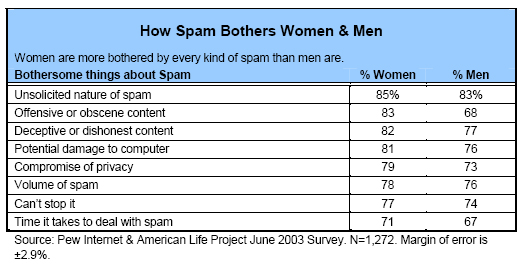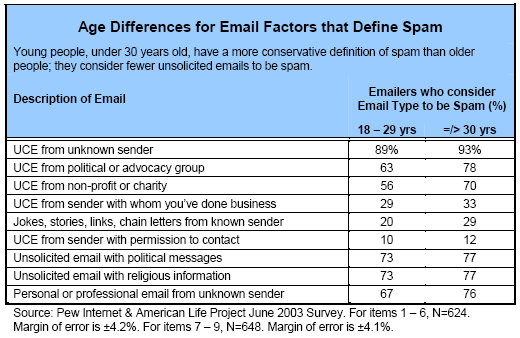Women, parents, young Internet users, and longtime Internet users have particular responses to spam.
A few demographic groups display distinctive behaviors or attitudes toward spam: women hate pornography; parents resent the risks spam presents to their children; younger users have a casual response to spam; veterans of many years’ Internet experience are particularly aggressive toward spam. What follows is a look at these different demographic realities.
Women are more bothered than men by spam.
More women than men expressed concern about every bothersome trait of spam we probed in our survey, but a few stood out. Significantly more women than men are bothered by offensive or obscene content of spam (83% v. 68%); by the deceptions and dishonesties in spam (82% v. 77%); by the sense that spam could mean their privacy has been compromised (79% v. 73%); and that spam could damage their computers (81% v. 76%).

Although men and women receive about the same volume of email, the same proportions of spam in those emails, and spend about the same amount of time processing the spam, more women than men say the spam gets in their way; women are considerably more likely to report that they get so much spam, it often makes it hard to get their real mail, both for work email (41% v. 28%) and for personal email (60% v. 51%).
Women find that spam interferes more with their ability to use email.
When asked to identify the kind of spam that bothers them most, men and women alike name pornographic spam above all others, together nearly four times the runner-up. And significantly, more women cite porn than men do (63% v. 42%).
One woman wrote in the TRAC survey:
- “Almost daily I get really nasty spam in my email account… (One) offers a ‘3 for 1’ deal so that I can have access to ‘real police videos’ of sexual assaults. The email promises that I have ‘never seen such cruel action.’ As a rape survivor, this email upsets me greatly.”
Consistent with findings in past research from the Pew Internet & American Life Project that men more likely than women push the edge in trying new Internet technologies and activities, we found here that men tend to do more to try to foil spam. Online men are more likely than online women to have taken precautions against spam: they are more likely to have used separate email addresses for times they are likely to attract spam (28% of men have done this, compared to 19% of women) or to have created email addresses that are more resistant to spamming (18% v 12%). Women, on the other hand, are more likely to have avoided giving out their email addresses (75% v. 71%). Men are a bit more likely to have applied their own filters (49% v 45%) against spam.
Men are also more aggressive in acting on spam they receive, both positively and negatively. While women are more likely than men to delete their spam immediately (88% v. 83%), significantly more men than women have clicked on a link inside spam to get more information (37% v. 29%), and have ordered a product or service (9% v 5%). More men than women have requested to be removed from mailing lists (71% v 63%).
Young people are more tolerant of spam than older Internet users and less strict in defining spam.
Young and old share concerns about spam, but more young people than older people show tolerance of spam; 32% of those ages 18 – 29 years say spam is “just part of life on the Internet and is not that big of a deal,” compared to 18% of those 30 years old or more. Some 63% of younger Internet users say, “Spam is a real problem on the Internet and more should be done to control it,” compared 73% of older users.
Consistent with this, young people are more likely to have a more conservative definition of spam; they consider more of their impersonal email to be legitimate email, not spam.

More young people are actively interested in the content of spam; significantly more have clicked on a link inside spam to get more information (41% v. 31%). And while young people are no more or less likely than older Internet users to go so far as to order products or services offered by spam, they are more likely to become victims of fraud. A whopping 20% of those under 30 years report that they have responded to an email offer, only to find out later that it was phony or fraudulent, compared to 9% of others.
Young people are more likely to become victims of email fraud.
The biggest concern for young people about spam is the risk that it will do damage to their computers. Some 21% of young people point to this as the trait about spam that bothers them most, compared to 13% of older users. Young people are also significantly more concerned than older people about spam’s spillover effects on email’s reliability, specifically; that they might lose some of their legitimate email. Significantly more young people are concerned that they might mistakenly misidentify and delete an important email (39% of those under 30 report this, compared to 25% of those 30 and above), that filtering software might block important emails from reaching them (39% v. 27%) or block their emails from reaching others (33% v. 20%).
Parents are very anxious about their children being exposed to inappropriate content through spam.
Parents of children under age 18 who live at home are more likely to object to the adult content in spam than non-parents. Some 81% of parents cite such objections, compared to 72% of non-parents. They have good reason to worry: A recent study by Symantec, an Internet security software company, reports that 80% of children who use email receive inappropriate spam daily. Half of those surveyed say they feel uncomfortable or offended by inappropriate emails. Almost half the kids receiving spam say they have received emails including links to pornographic sites. Some 22% say they have never talked to their parents about spam.11
Parents’ stories are graphic and even desperate. One parent reported in the TRAC survey:
- “My son, who is not a good speller, was trying to look at the Coke Website about a contest they were having. He accidentally spelled the word Coke wrong and several screens of naked men started popping up all over our computer. He immediately called me over to clear the screen, which took me several minutes to close all the screens that kept popping up. Since then his and my email accounts have been overrun with pornographic spam.”
- “Our computer is in a room where our grandchildren also play and when you are checking email this filth just pops up… what you get is not just words but filthy pictures. On more than a few occasions we have had our grandson in our lap reading email from family and without even having an idea when we delete the email the next thing up is a picture that you do not want to see let alone have a child see.”
- “I cannot open my email without receiving no less than 70+ emails spamming anything from sex to refinancing mortgages…. Most of the spam is so offensive it makes me sick to my stomach…. You should see how frantic I get trying to get it off the screen, before my children walk in and see this material. I’m so fed up, I have considered just discontinuing using the Internet all together.”
- “I had set up 2 email accounts, one for myself and one for my 9-year-old daughter… A couple of months later, the spam (including porno) began coming to Amber’s account. There were several a day. She didn’t even have to open the mail to see the vulgar words. They were right there when you opened your email account (in the subject line). We finally had to cancel both accounts!”
- “I recently set up email accounts for my two stepsons. Almost immediately, one of them began getting a lot of spam, including pornography ads that included pictures. … My kids need to learn about the Internet, but I don’t want them forced to see pornography just to have an email account….”
Parents are more driven than non-parents to take action against the spam. For instance, parents are more likely than non-parents to report the spam to their email providers (24% v. 19%).
Veteran Internet users are more sophisticated about spam.
Exposure to the Internet leads to awareness of spam. Longtime Internet users, those who have been online at least 6 years, are significantly more likely to have heard or read about spam than anyone else. Some 65% of longest users have heard about spam, compared to 55% of those who have been online 4 – 5 years, 49% who have been online 2–3 years, and 27% of those who have been online for a year or less.
Online longevity probably makes users more likely to recognize spam when they see it, rather than having trouble distinguishing it from their legitimate email. About 67% of those who have been online at least 6 years recognize spam right away, compared to 62% who have been online 4–5 years, 57% of those 2–3 years, and 46% for a year or less.
The longer people are online, the more adept they are at trying to avoid spam: Of those who have been online for at least 6 years, 29% have set up separate accounts to use when they are likely to attract spam, compared to 23% of 4–5 year veterans, 17% of 2–3 year veterans, and 7% of one year or less veterans. Some 74% of veterans of at least 6 years have avoided posting their email addresses on Websites, compared to 72% of 4–5 year veterans, 62% of 2–3 year veterans, and 54% of one year or less veterans. But the longest online veterans do not get less spam than others, possibly because they have been more exposed and vulnerable for their years on the Web. (Only the brand new users on the Web receive less spam.)
With more Internet years under their belts, Internet users grow increasingly intolerant of any kind of email that resembles spam. We asked about the content of various types of unsolicited email messages, from pornography to offers for health and medical content to political and religious messages. In every measure the longer Internet users had been online, the more likely they were to consider every kind of unsolicited message to be spam.
Similarly, Internet users seem to lose patience with spam over time. The longer they have been online, the more likely they are to simply dismiss spam rather than consider its content. Some 91% of 6-year veterans immediately delete their spam, compared to 81% of others. Further, the 6-year online veterans are more likely to ask to be removed from mailing lists than the rest (73% v.63%), report it to their email providers (24% v. 18%), and even report it to consumer or government agencies (10% v. 4%).




